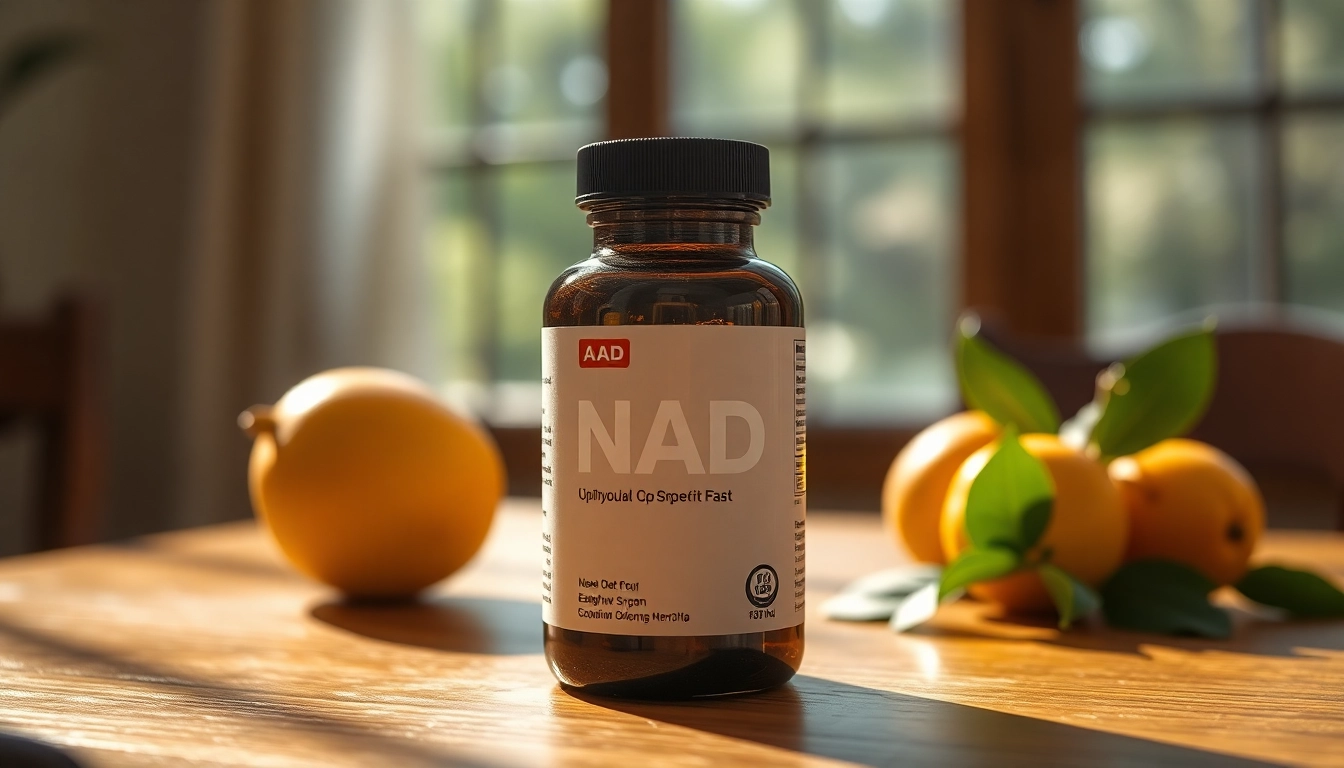Introduction to NAD Supplements
NAD supplements have recently emerged as a popular wellness trend, promoting claims related to energy enhancement, cellular health, and anti-aging properties. But what exactly are NAD supplements, and why are they gaining traction in the health and wellness community? The answer lies in their primary ingredient—Nicotinamide adenine dinucleotide (NAD), a critical coenzyme found in all living cells. This article dives into the world of NAD supplements, exploring their benefits, how to choose the right one, best practices for consumption, and the latest scientific findings surrounding them. For those interested in exploring NAD supplements further, visit NAD Supplement for more details.
What are NAD Supplements?
NAD supplements are products that contain varying formulations of Nicotinamide adenine dinucleotide, which is essential for cellular metabolism and energy production. NAD plays a crucial role in biochemical reactions that convert nutrients into energy. The body produces NAD from niacin (vitamin B3) and through a process that involves converting tryptophan into niacin. However, with age and various lifestyle factors, NAD levels naturally decline, prompting concerns about overall health and vitality.
The Role of NAD in Human Health
NAD is integral to various biological processes, including:
- Energy Production: NAD is a critical player in the Krebs cycle, where it helps convert carbohydrates, fats, and proteins into usable energy.
- Cellular Repair: NAD aids in DNA repair mechanisms, which protect cellular integrity and function. This is paramount, especially as we age and our cells encounter more damage.
- Gene Regulation: NAD contributes to the activation of sirtuins, proteins that play a significant role in regulating cellular health, stress responses, and even metabolism.
- Metabolism and Hormone Regulation: By influencing how the body utilizes energy, NAD also plays a role in regulating hormones and metabolism.
Common Misconceptions about NAD Supplements
As with any trending supplement, several misconceptions about NAD supplements circulate in the public domain. Here are some common myths versus the facts:
- Myth: NAD supplements can replace a healthy diet. Fact: While they can support health, NAD supplements should complement a balanced diet rich in nutrients.
- Myth: High doses of NAD are necessary for effectiveness. Fact: The effectiveness of NAD supplements can vary based on individual needs, and higher dosages do not always correlate with better outcomes.
- Myth: All NAD supplements are created equal. Fact: Different formulations may offer varying bioavailability and effectiveness, necessitating careful product selection.
Benefits of NAD Supplements
Boosting Energy Levels with NAD Supplements
One of the most touted benefits of NAD supplements is their ability to enhance energy levels. Since NAD is involved in energy metabolism, restoring its levels may help combat fatigue and improve overall vitality. Studies have shown that increasing NAD levels can support efficient energy production at the cellular level. This particularly resonates with individuals who experience age-related energy declines or those following rigorous physical training, where energy demands are heightened.
Supporting Cellular Repair and Aging
Aging is associated with the gradual decline of cellular processes, particularly those related to repair and regeneration. NAD supplements may promote longevity by supporting DNA repair mechanisms and improving cellular stress responses. Research indicates that NAD is vital for maintaining the function of sirtuins, which play a crucial role in extending cellular lifespan. In practical terms, individuals taking NAD supplements may notice improved recovery times from exercise or daily activities, alongside potential long-term health benefits.
NAD Supplements and Mental Clarity
Many proponents of NAD supplements claim that they can enhance mental clarity and cognitive function. The brain, being a high-energy organ, relies heavily on NAD for proper functioning. Some studies suggest that NAD may have neuroprotective effects, potentially slowing cognitive decline associated with aging. Users have reported feelings of improved focus, memory retention, and overall cognitive sharpness after regular NAD supplementation. This aspect is particularly appealing to students, professionals, and anyone looking to maintain cognitive health.
How to Choose the Right NAD Supplement
Understanding Ingredients in NAD Supplements
When selecting an NAD supplement, it is essential to scrutinize the ingredient list. Common forms of NAD precursors include:
- Nicotinamide (Niacinamide): A form of vitamin B3 that directly boosts NAD levels.
- Nicotinic Acid: Another variant of vitamin B3 that increases NAD by converting it more efficiently than other forms.
- NR (Nicotinamide Riboside): A newer supplement form that has shown promise in clinical studies for elevating NAD levels.
Be wary of any proprietary blends with undisclosed amounts or lesser-known compounds that may dilute efficacy.
Evaluating Dosage and Availability
Dosage is a crucial factor in the effectiveness of NAD supplementation. While clinical studies often use doses ranging from 250 mg to 3000 mg per day, individual needs can differ based on health status and lifestyle. Therefore, starting with a lower dosage and gradually increasing it while monitoring effects is often advisable. Additionally, ensure that the products are readily available and come from reputable suppliers, with third-party testing for quality assurance.
Price Comparisons of Different NAD Supplements
Price can vary significantly across different NAD supplements. Conducting price comparisons can help determine the best value based on quality and dosage. While it may be tempting to choose the lowest-cost option, considering the quality and bioavailability of the ingredients is essential. In general, investing in a supplement from a trusted company with positive customer reviews may yield better long-term benefits than going for the cheaper alternative.
Best Practices for Taking NAD Supplements
When to Take NAD Supplements for Best Results
The timing of NAD supplementation can influence its effectiveness. While individual responses vary, many users suggest taking NAD supplements in the morning with food to optimize absorption and energy levels throughout the day. This practice can help align the supplement with the body’s natural energy cycles and offer more visible benefits.
Combining NAD Supplements with Other Nutrients
For enhanced effects, NAD supplements can be combined with other synergistic nutrients such as:
- Coenzyme Q10: A powerful antioxidant that assists in energy production.
- Vitamin C: Supports cellular health and boosts immune function.
- Polyphenols: Found in berries and green tea, these compounds support migratory sirtuins and minimize oxidative stress.
It’s essential, however, to consult with a healthcare provider before combining supplements to avoid interactions and ensure compatibility.
Monitoring Effects and Adjusting Consumption
As with any supplement, monitoring how your body responds to NAD supplementation is vital. Keeping a health journal can help track changes in energy levels, cognitive function, and overall well-being. This feedback may guide dosage adjustments or even trigger considerations for discontinuation if adverse effects begin to surface. Regular consultations with healthcare professionals can further help tailor supplementation to individual health needs.
Scientific Findings and Research on NAD Supplements
Recent Studies on NAD Supplement Efficacy
Recent studies have shed light on the therapeutic potential of NAD supplements. Research has indicated that NAD precursors, such as nicotinamide riboside (NR), can effectively raise NAD levels in humans, leading to improvements in muscle metabolism, insulin sensitivity, and even physical performance. Ongoing clinical trials aim to delve deeper into the long-term impacts of NAD supplementation on health markers related to aging and chronic conditions.
Long-term Health Benefits Assessed in Research
Prolonged NAD supplementation has also been associated with promising health benefits beyond energy levels and cognitive enhancement. Some clinical studies suggest that sustained NAD elevation may have protective effects against age-related diseases such as neurodegenerative disorders, heart disease, and diabetes. More extensive longitudinal studies are essential to evaluating these claims comprehensively.
Future Directions in NAD Supplement Research
Looking ahead, research in NAD supplementation is rapidly evolving. Future studies are likely to explore personalized dosing regimens based on genetics, the interaction of NAD with various pharmaceuticals, and its role in a broader context of metabolic health. As our understanding of NAD deepens, it may become a cornerstone in preventative health strategies, further bolstering its relevance in the wellness arena.


